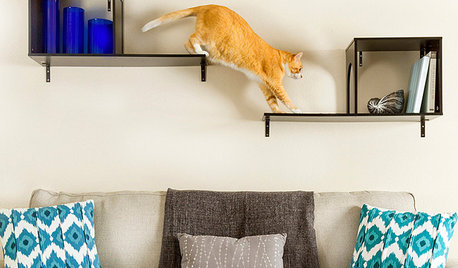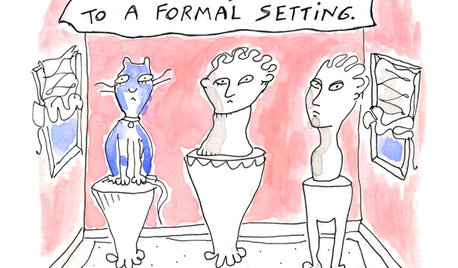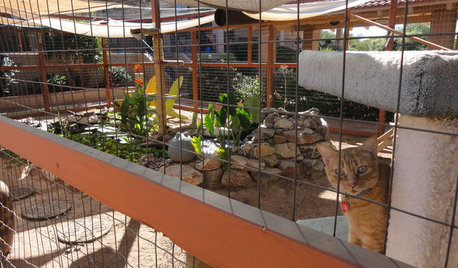How do mother cats 'correct' their kittens?
I know what mother dogs do, but wonder about cats. We rescued a kitten at about age 6wks. Very cute orange kitten, high energy and also bites. Trying to figure out how to correct the biting behavior.
Jane
Comments (19)
laurief_gw
10 years agolast modified: 9 years agoKittens bite. It's instinctive. The best thing you could possibly do for your kitten is to adopt another kitten to be his companion and play buddy. That way, they can chew on each other to their hearts' content and wear each other out. Kittens need to be able to roughhouse.
Laurie
Related Professionals
Bull Run Architects & Building Designers · Morganton Architects & Building Designers · Jacinto City Interior Designers & Decorators · Chicago Furniture & Accessories · San Diego Furniture & Accessories · Crofton Furniture & Accessories · Mundelein Furniture & Accessories · Bonita Cabinets & Cabinetry · Graham Cabinets & Cabinetry · Prior Lake Cabinets & Cabinetry · Bolingbrook Flooring Contractors · Kent Flooring Contractors · Norton Flooring Contractors · Palestine Flooring Contractors · Washougal Flooring Contractorsjane__ny
Original Author10 years agolast modified: 9 years agoThank you for your advice. We cannot take another kitten. He was taken away from his litter by someone who thought they were doing a good thing. We don't know how old he was when he came to us but I'm guessing around 4 weeks as he couldn't drink water and had difficulty eating. We wound up bottle feeding him.
We've had him now about a month. We've had cats all our lives but never one this young without his littler.
My concern is he should receive some sort of correction for biting which he does frequently. He is high energy and seems to attack everything in site including our legs, hands and arms. I try to correct him but he gets even worse. I've tried spray bottle but they don't bother him at all. I try to keep a rolled up magazine to wack the floor or chair to chase him away. I now close him in the laundry room when he becomes unmanageable.
He's not feral because he likes to be held and purrs when you pet him but that is only when he's not in attack mode.
My husband is 80 and I'm in my 60's. We've always had pets including cats, but of course they lived long lives and we were a lot younger when we had kittens. All our cats lived long lives. I don't remember any of them being this wild but I know we got them around 8-12 weeks (guessing).
I just hope he calms down as he gets older.
A picture of kitty being held by my son.
Jane
Rudebekia
10 years agolast modified: 9 years agoKitty is just adorable!! My Basil was extremely wild and playful as a kitten. I found that a sharp yelp or cry when he'd attack followed by a strong "no" and then immediately ignoring him and walking away worked pretty well. I'd also suggest some good quality play/roughhousing time every day to absorb all that energy. And your kitty will grow to be a cat and far more sedentary--eventually. Meanwhile, focus on the positive and enjoy this stage! Like children, they are only young once and each life stage brings its own fun.
schoolhouse_gw
10 years agolast modified: 9 years agoNo wonder he's so ornery, he's just so darn cute!
camlan
10 years agolast modified: 9 years agoTry hissing at the kitten when he does something you don't want him to do.
Another thing is a very, very light bop on the nose with a single finger. Just a tap to make contact--the goal is to get the kitten's attention, not to hurt it.
Double whammy is the light bop accompanied by a hiss.
If you watch mom cats, this is how they discipline kittens.
This method was advised to me by my vet. I never felt comfortable with the nose-bopping, so I just hiss at my cats. I'm at the point where I can be in another room, hear the cat jump onto the kitchen counter, hiss at him, and hear him jump off. They know what that hiss means.
And I agree--that is one cute kitten.
JohnBrady
10 years agolast modified: 9 years agoMy vet also suggested the one-bop on the nose. The hissing, though, is a divine suggestion. The kitten is just beyond adorable. Good luck!
alisande
10 years agolast modified: 9 years agoWhat a sweet little innocent! How could you even think he bites? LOL
I've found that except for the extra litter duty required, two kittens are less demanding than one because they keep each other amused. Another thought is to get one of those dangling cat toys--the kind that hang from a rod similar to a fishing rod. After a session of leaping in the air and sinking his baby teeth into the toy, he might (note I said "might") be less likely to bite. And surely he'd be more likely to nap.
Good for you for taking and raising that tiny kitten. You've done an excellent job. Some kittens don't survive being removed from their mother too soon.
lazy_gardens
10 years agolast modified: 9 years agoMother cats hiss and slap the kitten. You can do much the same by hissing and gently tapping the kitten on top of the head, or just swatting AT it with no contact.
SunnyDJ
10 years agolast modified: 9 years agoOh my is he a cutie.....He sounds just like my "Baylee Rose" aka, Baby Girl, who found her way to our porch when she was maybe 8 weeks old....Of course I couldn't leave her outside and with 2 others, I did keep her in one of the bedrooms until she was vet checked...But, she also went through that biting, full of energy, period...With the biting, I just kept saying, "No Bite" and even now if she starts to nip, a no bite will put a stop to that....She's also calming down but there are times when she just has to use up that energy and runs full force through the house....
But, I think, a gentle tap on the head and a firm NO will help......
Good luck with your furbaby, he sure is a sweetie......
jane__ny
Original Author10 years agolast modified: 9 years agoThanks everyone for all the good advice. Kitty is still a handful. Cute as a button (when he's good), but oh so bad (when he's bad). My arms and ankles are bloody!
He's a biter and nothing I've tried works. He also attacks any leg, foot or ankle which passes him by. He flies through the air and will grab your leg with all claws out. Takes a lot of dexterity to live in our house.
I hiss all day long, bump him on the nose, top of head and occasional grab him by the scruff of the neck and pull him off me. If I bump him on the nose/head, he attacks my hands. He gets so wild I'm not sure what to do. He flies across the rooms, jumping up on everything, knocking over whatever is there. He seems fearless, nothing scares him.
I tried using a spray bottle to spritz him. So I run after him as he climbs up the window screens, hissing and spraying trying to get him down. The spray bottle seems to make him wilder!
He's tiny, yet so agile and fast. When he quiets down, he's wonderful. I try to hold him and pet him as much as I can when he's calm. When he's wild, it doesn't work, he bites me.
So, life has taken quite a turn. My husband is afraid of getting bit or tripping over him (as flies between his legs). My husband is on meds which make him bleed and is not terribly steady on his feet. So, when kitty gets too wild, I put him in the laundry room until he calms down. It seems to be working.
I'm okay with kitty and am determined to stop him from biting. So far nothing is working. If anyone has another suggestion, I'd appreciate it. I had a dental appointment today and my dentist noticed all the band-aids and marks on my arms. Asked if I got caught in a thorn bush! I just told him, no we got a new kitten.
Kitty attacking my Peace Lily



Getting ready to climb up my Pachira Tree (which he has and has dug up the dirt and roots

Finally conked out and sleeping in my kitchen window.

Thanks again,
JaneSunnyDJ
10 years agolast modified: 9 years agoAs others might have suggested, another kitten might do the trick....And I do agree, 1 more is no more work...(Just ask me, aka, Cat Lady on our street, lol)...
Another thing, as soon as he's old enough to be altered, that might help and also keep his claws trimmed...If you can't do it, any groomer will be able too..... And there are things you can get to plug in that emits something to calm the furbabies....I've seen these advertised and also at pet stores......Those last pictures are priceless...Of course when they do put a number on your plants, that's not too good.....
laurief_gw
10 years agolast modified: 9 years agoI know you've said that you can't take another kitten, but if there is any possibility that you could work that out, it would be the best solution to your problem. You have a baby there who NEEDS to play hard and wrestle and work off all of that youthful energy. Without another feline to play with, he's naturally going to turn to you, your husband, and your possessions as targets for his aggressive play.
If you absolutely can not get him a same-species play partner, then here are two other tricks you can try. If you can manage it. blowing HARD directly into his face will put an immediate (but very temporary) stop to biting. While blowing in his face will stop one specific bite at one specific moment, the only way to put an end to his attacks on you is to wear him out and/or redirect his play to appropriate objects. You need to spend a LOT more time playing with wand toys or laser pointers with this boy ... anything that moves him AWAY from your own body.
Another trick you may try is to keep a long length of twine tied around your wrist with a toy tied to the other end. Then every time you walk around, you will automatically be dragging this toy on a twine behind you. That should redirect the kitten's attention to the twine toy and away from attacking your feet and legs. And it will hopefully help wear him out every time you walk around your house.
Laurie
camlan
10 years agolast modified: 9 years agoI agree that another kitten to play with would be ideal. Or an older cat that will discipline him.
If you can't do either, then I'd try a couple of interactive play sessions daily. Get a couple of different toys that you can swing or float through the air. The Cat Dancer is one my cats have all liked. There's a lot of feather toys out there that are popular with cats. And all mine have enjoyed just pouncing on a skinny strip of polar fleece as it is dragged along the floor--even She Who Does Not Play With Cat Toys will pounce on it from time to time.
Then set up at least two times per day when you play with the kitten for about 10 minutes. Throw things for him to catch and "kill." Or just throw things for him to run after. Then use the interactive toys to keep him moving--bounce them on the floor, have them "fly" to the tops of chairs, wave them over his head to get him to jump.
That might tire him out enough so that he isn't attacking you all the time. He's got the energy and it has to come out somehow, someway. The more you can direct it towards harmless channels, the better.
Vertise
10 years agolast modified: 9 years agoIt's already been said, but my experience has also been that they understand pain, so letting them know vocally that something hurts can work. They get softer and often start licking your hand. Even had a horse that responded like that.
Time out works too. I did that with one of mine and he seemed to get the message that tormenting his sister was not allowed or he'd wind up in the slammer.
Totally agree on getting him a bud. They can wrestle and romp to their heart's content. So much fun for everyone too. Right now, you are his playmate.
He sure is cute!!
This post was edited by snookums2 on Mon, Jul 29, 13 at 21:39
jane__ny
Original Author10 years agolast modified: 9 years agoThanks for all the good advice. Getting another kitten is out of the question. Right now, family is not happy with kitty.
Just to give a bit of background. We've had cats all our lives. Multiple cats who lived long lives so its hard for us to remember what they were like as kittens, but we don't remember being bit like this. I worry this could be a behavioral issue. We don't know how young he was taken away from his littler. Complicated story but the person who took the kitten saved his life. According to him, this kitten is the only one alive. I suspect he could have been very young. We got him after he was passed around for a few weeks. He wanted to nurse when we got him. His teeth appeared to not be fully in. We bottle fed him briefly until he was eating enough.
His behavior is disturbing to me. Corrections do not work and only infuriate him more. He has gotten smacked, tossed even stepped on and he continues to attack. Please understand, we are not abusing him, but when he suddenly bites your arm or leg, you react without thinking. It is painful.
He has tons of toys and we play with him as much as possible. He seems fearless and I haven't found anything which scares him. The biting is quite intense and it appears without provocation. He will be curled up against one of us and suddenly turn his head and bite whatever is closest. My stomach got bit yesterday! Not fun.
If I smack his nose or face, he immediately grabs my hands and bites hard with all claws out. Nothing will stop this, even water (tried spritzing water). I have to grab him by the scruff of neck (to avoid his teeth and claws) and put him in a room and close the door. Nothing else will stop this, no hitting, blowing air, hissing, etc. I have tried these techniques over and over thinking he would quit, but he doesn't. He gets wilder and very angry.
I have not seen this before in my previous kittens. I'm sure of it. Kittens play, but this is not play. Its becoming so that we are very wary of petting him or picking him up. You don't see it coming.
I wonder if an adult female cat would work better than another kitten? I would be fearful putting him with another kitten. An adult female might be able to deal with it, I'm not sure and would appreciate your thoughts.
I would also appreciate any links to sites which might have more information on what is happening. I want this to work but I can't allow this behavior to continue.
Thanks again,
Janelaurief_gw
10 years agolast modified: 9 years agoJane,
What you are experiencing is one manifestation of the aberrant behavior potentially developed by a kitten who is weaned before learning proper socialization and behavior from his mother and littermates. Your kitten missed out on a critical portion of his early behavioral and psychological development, and you are reaping the painful results.
I understand why you would think that an adult female cat might be the answer. I assume you believe that her maternal instincts may kick in and that she may teach and discipline him appropriately. In my experience, however, adult females often aren't at ALL tolerant of rowdy male kittens, particularly when they aren't their own. If you could find an adult female with a known history of successfully raising orphaned kittens, that might be an exception, but barring that history, I wouldn't risk it.
I think you might have more luck with an adult male with a known history of getting along with kittens. Male felines have an altogether different way of interacting and playing with each other than do females, or females and males. Your little monster needs someone who he can chew on who will give back as good as he gets ... BUT who is also experienced enough with kittens to temper his play so that the little one doesn't actually get injured.
If I were you, I'd explain your situation to all of the rescues and shelters in your area and see if they have any adoptable adult males who they feel meet the criteria and experience with kittens. Then see if you can arrange a "trial period" to see how things go between the potential adoptee and the baby monster. You certainly don't want to commit to an adoption until you know that the two will get along properly and safely. But it may take a week or two for a relationship to develop.
Now for a little heads-up. Males tend to go for the jugular during play. When I rescued the GoBoys at around 5-6 weeks of age, one of my adult males would chew endlessly on their little jugulars, making me mighty nervous in the process. The babies never objected, however, and the adult never drew blood. I just wasn't accustomed to seeing male felines play, so I didn't realize that jugular-crunching was a common tactic. But even as adults, my males love to chew each other's jugulars during play. It's a boy thing. I've never seen any of my females do it.
Laurie
camlan
10 years agolast modified: 9 years agoOh. Sounds a little bit like a cat I rescued. Here's the story, there might be something here that will help.
Found a stray cat in my yard. About 12-18 months old, not neutered. Took him in, kept him separate from my two older female cats until after vet visits, surgery, etc.
He was a very jumpy, nervous sort of cat. He jump in my lap, stay for 10 seconds and jump off. I could pet him for about a nanosecond, and then he'd turn and bite me. Hard. Never broke the skin, but did leave bruises. Forget about picking him up or holding him. That was NOT going to happen. The bites would come out of nowhere--he'd be sitting next to me and just suddenly bite my hand.
Introduced him to my other cats, slowly, following every idea I'd ever read about. Didn't work. He attacked them. He'd chase them under my bed and they were afraid to come out. He'd keep them from the food and water and litter box.
Attempts to place him in a shelter failed. So, because I was living in a small, one-bedroom apartment, he was confined to my bedroom. (A litter box in my bedroom, oh joy!) Every day, for about 45 minutes to an hour, I'd go in and play with him. Lots of dangling, interactive toys. Things that would tire him out.
During this time, I did not try to pet him or hold him or touch him. I'd just play with him. And he got to sleep on my bed at night with me, if he wanted to. And I talked to him all the time I was there and awake. I'd read in bed before going to sleep and I'd read out loud to him.
During this time, he'd accidentally scratch me while playing, or if I moved while asleep in the night. The backs of my hands and my forearms were covered in scratches for months.
It took about 11 months, but one morning, as I was sitting on my bed, he crawled into my lap. I held my breath, I tell you. He sat there for at least a minute, then walked off. That was the turning point. Very, very slowly, I started to pet him. And he stopped biting. About a year and a half in, and he started to purr so I could hear.
It got to the point where I'd walk into the bedroom, and he'd start jumping around, because he knew he'd get half an hour of play, and then half an hour of lap time. I'd wake up in the morning, and he'd be pushing his head into my hand to get ear rubs.
Sadly, despite my best attempts, I could not get him to stop attacking the other cats. And he learned how to open doors. After the third vet visit for an abscess for my older cat, I had to find him a new home where there were no other cats.
So this might sound like counter-intuitive advice, but maybe confine him to a smaller space for a few months. A big house and big yard might be frightening to him. Everyone in the house should agree to not pet him, not pick him up. Let human contact be on his terms. Two play sessions a day. Lots of talking to him.
If he bites, everyone should use the exact same correction--a hiss, a bop on the nose, and then remove yourself from the cat. (Or whatever correction you choose.) I think it is very important to be consistent.
It will take a lot of time. It took over a year before my cat was anything close to "normal" for a cat. Yours is younger, so maybe he will be able to change more quickly. But I don't think there is a quick fix for this situation.
camlan
10 years agolast modified: 9 years agoOh. Sounds a little bit like a cat I rescued. Here's the story, there might be something here that will help.
Found a stray cat in my yard. About 12-18 months old, not neutered. Took him in, kept him separate from my two older female cats until after vet visits, surgery, etc.
He was a very jumpy, nervous sort of cat. He jump in my lap, stay for 10 seconds and jump off. I could pet him for about a nanosecond, and then he'd turn and bite me. Hard. Never broke the skin, but did leave bruises. Forget about picking him up or holding him. That was NOT going to happen. The bites would come out of nowhere--he'd be sitting next to me and just suddenly bite my hand.
Introduced him to my other cats, slowly, following every idea I'd ever read about. Didn't work. He attacked them. He'd chase them under my bed and they were afraid to come out. He'd keep them from the food and water and litter box.
Attempts to place him in a shelter failed. So, because I was living in a small, one-bedroom apartment, he was confined to my bedroom. (A litter box in my bedroom, oh joy!) Every day, for about 45 minutes to an hour, I'd go in and play with him. Lots of dangling, interactive toys. Things that would tire him out.
During this time, I did not try to pet him or hold him or touch him. I'd just play with him. And he got to sleep on my bed at night with me, if he wanted to. And I talked to him all the time I was there and awake. I'd read in bed before going to sleep and I'd read out loud to him.
During this time, he'd accidentally scratch me while playing, or if I moved while asleep in the night. The backs of my hands and my forearms were covered in scratches for months.
It took about 11 months, but one morning, as I was sitting on my bed, he crawled into my lap. I held my breath, I tell you. He sat there for at least a minute, then walked off. That was the turning point. Very, very slowly, I started to pet him. And he stopped biting. About a year and a half in, and he started to purr so I could hear.
It got to the point where I'd walk into the bedroom, and he'd start jumping around, because he knew he'd get half an hour of play, and then half an hour of lap time. I'd wake up in the morning, and he'd be pushing his head into my hand to get ear rubs.
Sadly, despite my best attempts, I could not get him to stop attacking the other cats. And he learned how to open doors. After the third vet visit for an abscess for my older cat, I had to find him a new home where there were no other cats.
So this might sound like counter-intuitive advice, but maybe confine him to a smaller space for a few months. A big house and big yard might be frightening to him. Everyone in the house should agree to not pet him, not pick him up. Let human contact be on his terms. Two play sessions a day. Lots of talking to him.
If he bites, everyone should use the exact same correction--a hiss, a bop on the nose, and then remove yourself from the cat. (Or whatever correction you choose.) I think it is very important to be consistent.
It will take a lot of time. It took over a year before my cat was anything close to "normal" for a cat. Yours is younger, so maybe he will be able to change more quickly. But I don't think there is a quick fix for this situation.





















Elly_NJ